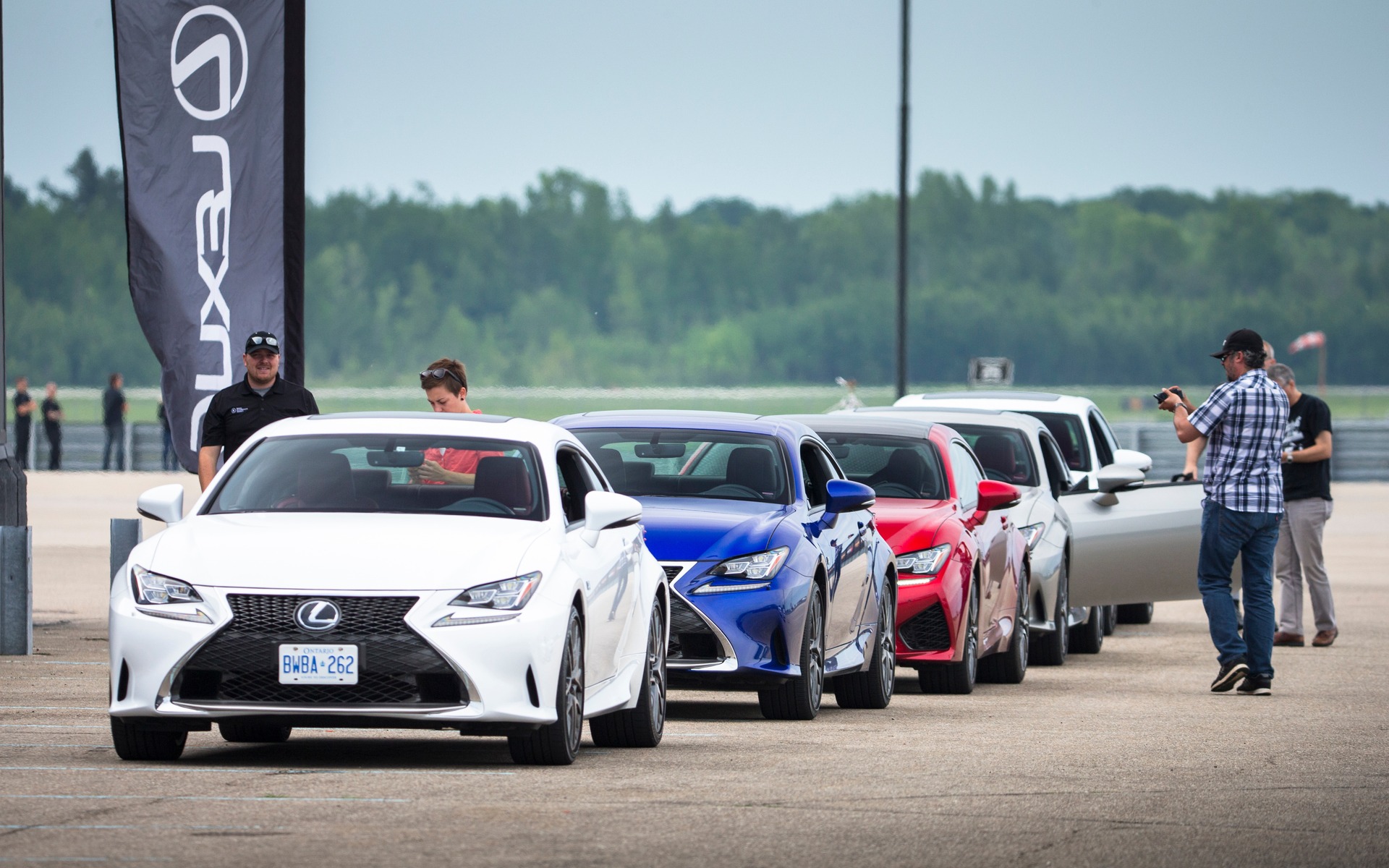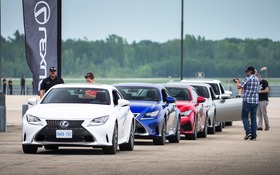Lexus Gets Its NASCAR On At Circuit ICAR
Don’t worry, Lexus is not setting its sights on NASCAR! But that didn’t stop Toyota’s prestige brand from inviting automobile journalists out to Circuit ICAR. They wanted to let us test out a few of their creations—the ones that are best suited for track driving. Let’s take a closer look.
On a gorgeous morning, a dozen Quebec journalists came together to test these cars:
- GS 350 TI F-Sport
- IS 350 TI F-Sport
- RC 350 TI F-Sport
- IS 350 F-Sport
- RC 350 F-Sport
- RC-F
I had the chance to try them all in ascending order, meaning that I started with the least sporty car and worked my up to the most athletic of the bunch.
GS 350 AWD F-Sport
My first few laps were in the GS 350 AWD F-Sport. This luxury sedan was equipped with the adaptive variable suspension (AVS) and vehicle dynamics integrated management (VDIM) systems. As you’ve probably already guessed, the “AWD” in its name stands for “all-wheel drive.”
Despite these ingredients, it didn’t take many laps around the track before I realized that this car simply isn’t cut out for this type of exercise. Even in Sport + mode, the suspension is too soft and can’t contain the car’s relatively high weight. Not to mention that the safety systems jump in too soon, including whenever the car takes a corner with the least amount of speed.
To make matters worse, the six-speed automatic transmission had trouble keeping up. Even in manual mode, it was reluctant to obey orders and its computer overrode the driver, making decisions that were not particularly sporty.
The brakes held up well, but I doubt they would last very long at a sustained pace without losing their bite. But there’s no sense in blasting this car for the way it handles on the track. After all, people who buy a GS 350 AWD (F-Sport or otherwise) aren’t likely to take it out for a serious day of action on the race track!
IS 350 AWD F-Sport
Next, I tested the IS 350 AWD F-Sport. Its handling proved much better than the GS I drove before it, probably because it weighs about 50 kilos (110 pounds) less. As a result, the 306 ponies (the same amount as in the GS) have a lot less weight to haul. The tires (P225/45R17 in front and P245/45R17 in back) have better grip on the asphalt. Like in the GS, the six-speed transmission has trouble keeping up with a fast pace, however its manual mode is more responsible and when the computer calls the shots, the decisions are better suited to this kind of driving.
RC 350 AWD F-Sport
Then I got my hands on the RC 350 AWD F-Sport. Its 3.5-litre V6 is the same mill found in the GS and IS, but it produces 307 horsepower in this vehicle. The RC’s one extra pony and 5 extra kilos didn’t make any difference, at least not that I could tell. Maybe a pro driver would be able to notice the difference.
That said, the RC’s reflexes are a bit sharper. Nothing major though, and certainly nothing that would put the IS to shame. Overall, I would say that the RC is 5% better than the IS—but keep in mind that this percentage is totally arbitrary and doesn’t mean anything unless you’ve recently driven the IS. The tires, which are both bigger and wider, no doubt account for a lot of it (235/40R19 in front and 265/35R19 in back compared to 225/45R17 in front and 245/45R17 in back on the IS).
IS 350 RWD F-Sport
Then I moved on to the IS 350 RWD F-Sport. The first thing I noticed is that its eight-speed transmission is much more brazen and has no trouble keeping up with track speeds. The adaptive variable steering doesn’t transform the car’s handling, but it is more direct.
At the very least, it’s easier to get the car on the right trajectory by playing with the accelerator, as only the rear wheels are powered (that’s what the RWD stands for). Still, the car doesn’t really feel like it’s in its element on the track, even though it could probably stand to be pushed harder than I pushed it. I don’t think it’s as good as a BMW 335i, but I’d love to pit them against each other in a comparative match-up!
RC 350 RWD F-Sport
Next, I swapped the IS for an RC 350 RWD F-Sport. Once again, I got the impression that the RC was 5% better than the IS, except when it comes to accessing the rear seats, since this is a coupe. At this point I started driving a little more mischievously, maybe because I was more familiar with the track.
At one point I put it into Sport + mode and made an overly-enthusiastic exit out of a hairpin turn. This let me see for myself that the car was able to maintain control, and all I had to do was ease off the accelerator. The other thing I noticed is that the stability control systems intervene really late! The higher I “rose” through the Lexus hierarchy, the more I noticed the difference between Sport and Sport +.
RC-F (aka the cherry on top)
At last, pure bliss when I got my chance to drive the RC-F, the day’s headliner. The 467 horsepower and 389 lbs.-ft. of torque threw the speedster around the first corner with so much force—and sound—that I found myself braking, even though I shouldn’t have. Once my surprise subsided, I quickly regained my confidence and got the car exactly where I wanted it to be.
The steering is remarkably precise and allows the driver to control the vehicle’s position down to the millimetre. For a while, I left the eight-speed transmission in automatic mode, wondering why anyone would want to shift manually on a car that does such a great job on its own. I couldn’t help but look forward to the next curve!
On the circuit’s “long” straightaway, I realized I had it in Sport mode. As soon as I engaged Sport +, the vehicle leapt forward. When decelerating, the transmission let the revs climb, as if I was heel-toe downshifting. Fun. The brakes are flawless, at least for my purposes, with good stability and no overheating.
As soon as I start trying my hand at manual shifting (which the transmission does in thousandths of a second), I get the signal that it’s time to head back to the pits. The fun is over.
In conclusion
It’s important to clarify that I was only able to compare the various Lexus models against each other. While the RC-F was a cut above the RC 350 RWD F-Sport, how would it compare to a BMW M4, Jaguar F-Type R, Audi RS5 or Mercedes-AMG C63 S? I think a comparison test is in order!












